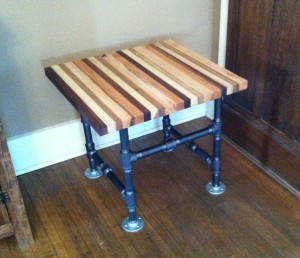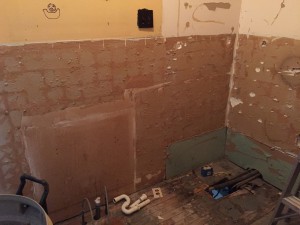I get a spiritual high out of doing home construction and renovation. I know that sounds strange, but its true. Building and repairing things actually makes me feel closer to God. For many years, I didn’t know why carpentry had this effect on me, but I’ve finally figured out why.
It started about twenty years ago when I built my first book case. Then came another and then another. Eventually, Amy asked me to build an entertainment center, and from there my projects expanded to, among other things, tables…
stairs…
beds…
and a buffet…
Alongside my furniture construction there grew an increasing interest and competence in home repair, from basic plumbing and electrical to roofing, drywall, and flooring, especially tiling. My latest renovation project, which I completed just this week, was on our downstairs bathroom in our “new” house (built in 1920) in Upland. Here is the progression of the project…
Of course, these projects are satisfying, if only because they are practical and make a home look better. But I believe the joy I experience in doing (and finishing) this work derives from aspects of carpentry which trace back to the imago Dei in human beings:
- Carpentry is creative—As is clear from the first chapters of Genesis and, well, the entire world around us, God is a fundamentally creative. That we humans are divine image-bearers explains why we are also irrepressibly creative. Carpentry is an especially significant mode of creativity, because it features both practical and aesthetic goods. The products, if done right, are both functional and beautiful. That’s an accurate description of the divine artwork that is the physical universe, and to the extent that we engage in creative construction, we mirror this divine creative activity.
- Carpentry is redemptive—When you live in old houses, as we have for the last fifteen years, there is always plenty of repair and renovation to do. To repair and improve is essentially redemptive and thus Gospel-like, a fulfillment of the biblical mandate to address the consequences of sin. Construction repair work is the “healing” dimension of carpentry.
- Carpentry is a whole-person activity—Carpentry involves not just one skill but numerous particular skills which require competencies with a variety of tools as well as design and measurement tasks. It is physically and intellectually demanding, and it also requires significant value judgments pertaining to everything from finances to aesthetics and even ethics. If being a servant in the Kingdom of God requires challenging and developing as much of yourself as possible, then carpentry is the ideal discipline for such training.
I would add that as a teacher and scholar I also find a special satisfaction in carpentry because the result of one’s construction toils are tangible and, at least potentially, indisputably excellent. Even the most well-constructed lecture, argument, journal article, or book can be disputed or casually dismissed. But there is no (reasonable) disputing or dismissing a superbly constructed table, bed, buffet, or bathroom. Here, again, there is a parallel in divine creation and redemption. God does not offer us mere arguments that he is powerful, wise, innovative, and gracious. Rather, he demonstrates this in his creative and wise construction of the universe as well as his innovative and gracious ministry of redemption on earth in the person of Jesus of Nazareth. And, speaking of him, I wonder if it is just a coincidence that Jesus’ vocation for most of his adult life was apparently that of a carpenter or craftsman of some sort (cf. Mark 6:3). Hmm….















John Brashier
Love reading your words man! Hope life is good!! Peace, JB
Jim Spiegel
Thank you, brother!